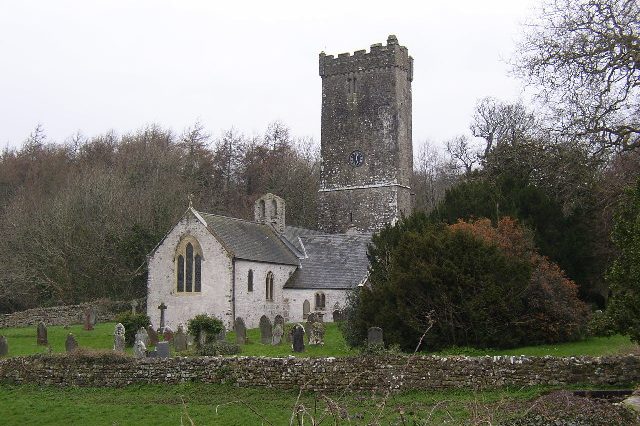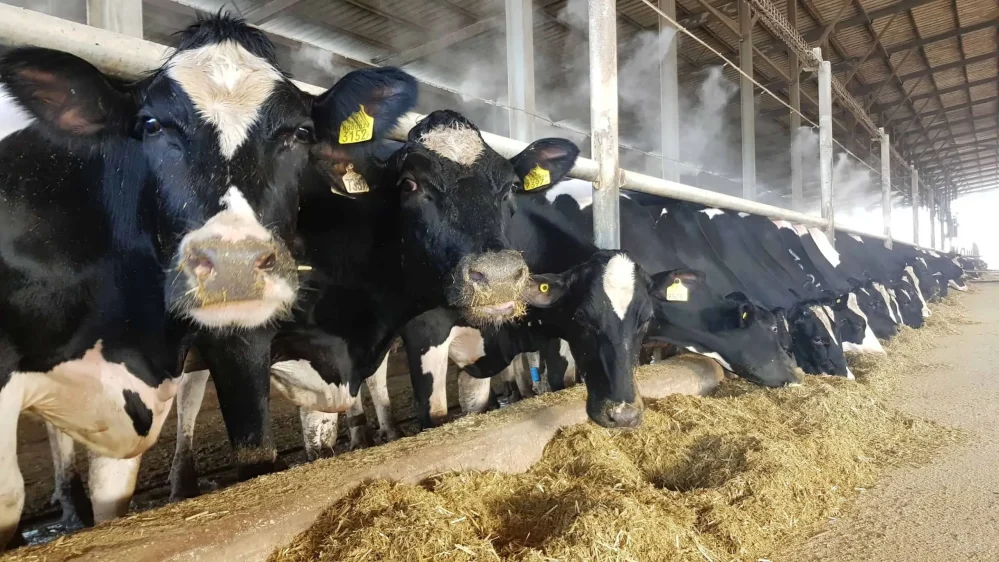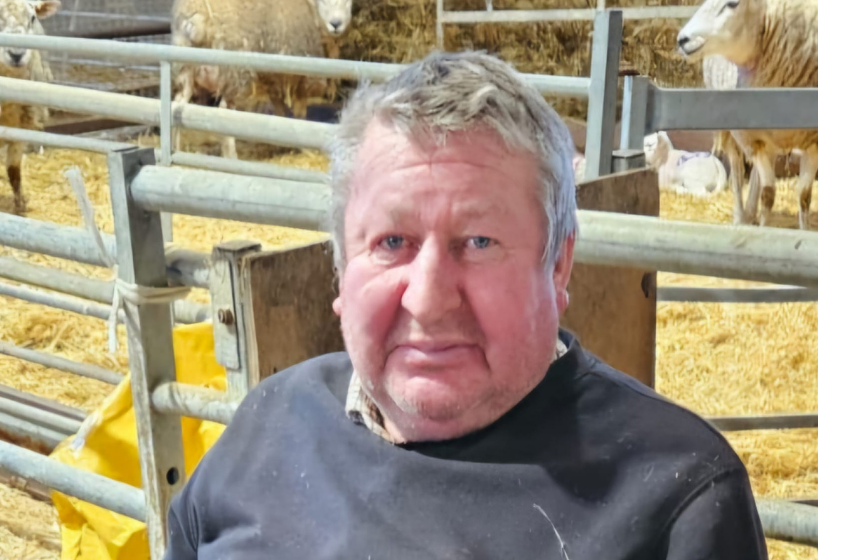Farming
Utilising Farming Connect helps young farmer prepare for greater role on sheep farm

FARMING CONNET’S training and development opportunities have helped Ernie Richards learn about best practice in agriculture and the latest thinking on technical and business management ideas, giving the young farmer the confidence and knowledge to take on a bigger role in his employer’s upland sheep farming enterprise.
Ernie manages a flock of pedigree Lleyn ewes for Stuart and Helen Morris at 350-acre Wernoog, near Clyro, Powys.
His understanding of flock health and performance and the farm’s environmental obligations has been augmented by multiple Farming Connect accredited learning courses and wider activities, including discussion group membership.
Ernie claims that continuous professional development and learning to do everything well has benefitted both him and the Morris family.
As his knowledge and confidence have grown, the couple have been able to take a step back, moving off the farm to allow Ernie and his family to move into the farmhouse to put him at the centre of the day-to-day management of the enterprise.
As he steps up into that role, he will draw on the Farming Connect Leading and Managing training course he completed in 2023.
“We will have two students with us for up to six weeks during lambing and for the first time it will be me who will be responsible for managing them,’’ he explains.
“I learned so much on the Farming Connect Leading and Managing training course that will help with that.’’
The flock they will be lambing is a closed flock of 1,000 pedigree Lleyns.
Reliance on wormers in the high health status flock has been reduced thanks to faecal egg counting (FEC). To further his knowledge on this, Ernie has completed a Farming Connect Introduction to Worm Control and Faecal Egg Counting for Sheep Producers course.
“We know we have resistance to certain drenches, using FEC means we now only treat when the lambs need it,’’ he explains.
There is a strict culling policy for ewes that experience problems at lambing, those with poor udders or persistent lameness.
Maximising the value of those cull ewes is an important income stream for the business and this is again where Ernie’s utilisation of Farming Connect services has helped. The subject was a theme at one of the meetings for the Farming Connect discussion group he is a member of, covering topics such as selling at the right time.
Membership of that discussion group allows Ernie to share ideas, problems and solutions with other like-minded farmers, and benefit from the technical expertise of speakers such as Phillipa Page, of Flock Health Ltd.
“We are all focussed on the same sort of things, we are very open with each other and keep in touch between meetings via a Whatsapp group,’’ he explains.
“We now have some funding to look at iceberg diseases and to blood sample our flocks for those.’’
Similarly, Erine was fortunate to be selected for the Agri Academy in 2021 and will be reaping the benefits of the invaluable support network and friendships forged through the Academy for many years to come.
As the Water Resources (Control of Agricultural Pollution) (Wales) Regulations are rolled out across Wales, Ernie has also been making use of Farming Connect services to understand what that means for the business at Wernoog.
Last year he completed a training course on environmental awareness, audit and management of farm businesses.
“This focussed on the new rules and it helped me get my head around what we needed to do to be compliant with those,’’ says Ernie.
A record of the certificates he has gained and courses completed are all stored on Storfa Sgiliau, Farming Connect’s online data storage tool.
“Although I have paper copies of the certificates too, it is really useful to have everything stored online and in one easily accessible place, through my BOSS (Business Online Support Service) account,’’ says Ernie. You can also download a complete report of all your records, all in a single document.
He says he is fortunate that Stuart and Helen recognise the value of ongoing training and development.
“They have allowed me time away from the farm to do these things and I am grateful for that.
“I am trying to move forward all the time, trying to understand as much as I can about farming, and they recognise that this will help them too.’’
Looking to the future, Ernie, a member of the NFU Cymru Next Generation Group, sees good opportunities for the next generation of farmers.
“New entrants are the lifeblood of any vibrant industry, and farming is no exception,’’ he says.
“It can be a difficult sector to get a foothold in for young people with no background in agriculture but going forward I think we will see many more different ways to help make that happen.’’
Keep up to date with the latest Farming Connect has to offer you and your business by visiting our website, social media channels or by speaking to your local Development Officer. The Agri Academy application window is open NOW and will close on 15 April 2024.
Farming
Farm building scheme near Lawrenny given go-ahead by planners

AN APPLICATION for a storage building at a south Pembrokeshire farm, made by a family member of an officer on Pembrokeshire County Council’s planning service, has been given the go-ahead by the authority’s planning committee.
In an application recommended for approval at the July 23 meeting of the authority’s planning committee, Laura Elliot sought permission for the erection of an agricultural storage building at Tedion Farm, a dairy farm near Lawrenny.
The application had been brought to committee, rather than being delegated to planning officers, due to the family connection.
The farm, near to the Pembrokeshire coast National Park border, comprises 270 milking cows and dairy heifer replacements kept on the farm comprising land over 138 hectares. The farm is mainly down to grass and the cows are paddock grazed in order to utilise grass efficiency.
No objections had been received from local community council Martletwy.
A report for members said: “The application seeks consent for the erection of agricultural storage building. The erection of an agricultural building will be used to store stay, hay and farm machinery.
“The building would be located within the existing farm complex, to the north-east of the site, adjacent to the main farm dwelling. The building will measure 18 metres in length by 13.6 metres in width, with a pitched roof height of 5.71 metres.”
Approval was moved by Cllr Alistair Cameron, seconded by Cllr Brian Hall.
Farming
Fears dairy farm near Kilgetty could increase to 3,000 cattle

PEMBROKESHIRE planners are to visit the site of one of the county’s largest dairy farms after claims were raised a scheme for new calf buildings could lead to animal welfare issues and an increase in the size of the herd to 3,000 cattle.
At the July 23 meeting of the council’s planning committee, an application by Hugh James of Langdon Mill Farms Ltd for a calf building, weaned calf building, and associated yard areas, at Langdon Mill Farm, near Jeffreyston, Kilgetty was recommended for conditional approval.
Local community council Jeffreyston has raised concerns, made by a member of the public, on potential increased noise and odour from the scheme, planners heard.
A supporting statement, through agent Reading Agricultural Consultants, said: “The holding currently has a milking herd of approximately 2,000 cows, which are housed indoors for the majority of the year, with dry cows [cows that are not lactating, prior to calving] and heifers grazed outdoors when weather and soil conditions permit.
“There has been significant investment in buildings and infrastructure at the farm over the last decade in respect of cattle accommodation, slurry storage, milking facilities, Anaerobic Digestion (AD) plant and feed storage. The unit is efficient, achieving yields of more than 10,000 litres/cow/year, with cows being milked three times/day in the 60-point rotary parlour.”
Currently, calves are reared at Langdon Mill Farm for two months before being transported off-site to be reared at a number of third-party farms in the area before being return later; the proposed 61.2m long calf building is required to accommodate young-stock, following separation from the cows, to two-months, with the 164.8m weaned calf building to be used for calves from two months to seven months.
The application says the proposals would “clearly make the enterprise more financially robust by reducing reliance on third party farms”.
However, concerns were raised at the committee meeting by objector Ian Dennis, a former vet of some four decades’ experience, who described Langdon as occupying 3,000 acres of land with 2,000 cattle currently that “are never allowed to graze,” the proposal, he said, would add another 1,000 cattle to the site.
“This is factory farming, an intensive livestock unit, no longer a farm.”
He told planners a “mendacious and incorrect” ammonia emission report submitted by the applicants was “designed to bamboozle,” saying, despite his experience and scientific background, he needed expert support to assess.
He said only average figures were reported, rather than peaks and troughs, adding the “fictitious anaerobic digestion plant” had yet to be built, with planning permission now lapsed.
However, officers told members the applicant’s agent had said works on the digestor had actually started.
On the issue of animal welfare, Mr Dennis said he had “very huge concerns” about the scale of the development, differing from a planning officer report saying the scheme would bring animal welfare benefits.
A suggestion by committee chair Cllr Simon Hancock the application be deferred pending a site visit was unanimously backed by committee members present.
Farming
Family pay tribute to farmer, 65, who died in quadbike accident

A WEST WALES farmer has died after an incident involving a quadbike.
Dyfed-Powys Police have confirmed they attended a report of an incident involving an agricultural quadbike in a field in the Llanilar area of Aberystwyth on July 17.
The force has confirmed that a 65-year-old man died at the scene.
They said that his next of kin have been advised and are being supported by specialist officers. The HM Coroner and Health and Safety Executives have been informed.
His family have paid tribute to him. The family said: “Hugh Tudor was a 65 year old farmer who had farmed at Tynberllan, Llanilar with his wife Ann for over 40 years. He was a devoted father to Sara, Lowri and the late Gwenno.
“Hugh was the son of the late Tom and Sybil Tudor of Glanystwyth and brother to Richard.
“Farming was his life, but he also had a wide range of interests and was actively involved in all aspects of the local community in Llanilar and beyond.
“We would like to thank everybody for their support and kindness during this difficult time.”
-

 Education5 days ago
Education5 days agoMilford Tesco worker achieves Oxford dream and lands top legal job
-

 Crime4 days ago
Crime4 days agoHaverfordwest man admits having nearly 1000 child and animal images
-

 Crime4 days ago
Crime4 days agoYouth set to appear in court over serious sexual offences
-

 Crime4 days ago
Crime4 days agoPolice investigating after man injured during altercation in cemetery
-

 Education4 days ago
Education4 days agoPupils delight in ice cream treat from Pembrokeshire’s number one van
-

 Crime4 days ago
Crime4 days agoTown centre ‘stinking of skunk’ as police strip cannabis farm
-

 Crime3 days ago
Crime3 days agoFag-butt police court summonses spark debate in Pembrokeshire
-

 News6 days ago
News6 days agoProposal to give firefighters a council tax discount to go to Cabinet































